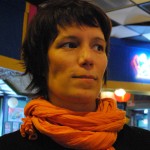Melissa Dittmer
Detroit, Michigan

Melissa Dittmer is a design architect and associate at Hamilton Anderson Associates (HAA) a multidisciplinary design firm based in Detroit. She received a Bachelor of Architecture from the Illinois Institute of Technology and a Master of Science in Architecture and Urban Design from Columbia University. Her design projects have been featured in the publications: Constellations: Constructing Urban Design Practices, Constructing Urbanisms : Design Competitions, and ‘Places : Design Observer’. Her articles on architecture, urban design theory, post industrial strategies, and professional practice have been published in critical international journals Topos, MONU, Metropolis, and The Plan.
She is the co-creator and director of rogueHAA, a volunteer architectural, design, and urban advocacy collaborative based in HAA’s Detroit office. While HAA focuses on the thoughtful design and construction of buildings and landscapes, rogueHAA operates outside the boundaries of traditional professional design practice. The group’s primary goal is to serve as both a catalyst and forum for thoughtful design discourse through a series of initiatives including publications, competitions, installations, www.roguhaa.com, and their free multi-topic speaker series.
Most recently, Melissa has been working on the long-term planning portion of the Detroit Works Project, a multi-disciplinary, international effort to define the future of a depopulated, post-industrial city.
Melissa lives with her husband and two sons in Detroit.
Presentation(s):
rogueHAA: the architect’s CALL-TO-ARMS
Day 2 / Apr, 13 @ 2:45 pm
Lower Level : Room C
CALL-TO-ARMS. The architecture and urban advocacy collaborative, rogueHAA, has issued an architectural call-to-arms for the Detroit architectural community. For their conference presentation, Melissa Dittmer and Dan Kinkead will issue the charge that it is time for a shared architectural revolution. They will illustrate the power of the non-traditional architect within a post-industrial city. Utilizing analysis and strategies created within the Detroit Works Project (a comprehensive framework to improve the quality of life for Detroiters by guiding future decision making) Dittmer and Kinkead will demonstrate the function of an architect within a society consumed with economic, social, physical, and environmental crises.
Post-industrial architects need to be more creative, more thoughtful, and more pro-active towards the revitalization of their urban environments. By fostering a unifying trajectory, we can provide a broader public the opportunity to take control of our shared design destiny.





